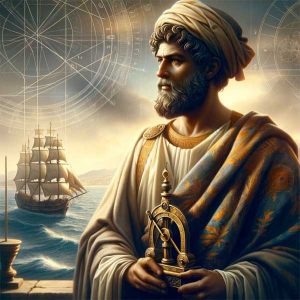Pytheas of Massalia (modern-day Marseille, France), who lived in the late 4th century BCE, was a Greek geographer and explorer renowned for his voyages in the North Atlantic and his exploration of Britain and the surrounding seas. Despite the scarcity of direct records from his time, Pytheas is credited with providing some of the earliest written accounts of the British Isles, the North Sea, and possibly parts of the Arctic Circle.
Voyages and Discoveries
 Pytheas is most famous for his voyage from the Mediterranean to the northern reaches of Europe, including a circumnavigation of Britain and a detailed description of the island. He is believed to have sailed beyond Britain to reach a land he called “Thule,” which has been variously identified with Norway, Iceland, or even the Shetland Islands, though the exact location remains a subject of debate among historians and archaeologists. His accounts of Thule and the phenomenon of the midnight sun are among the earliest European descriptions of the Arctic and its unique environmental conditions.
Pytheas is most famous for his voyage from the Mediterranean to the northern reaches of Europe, including a circumnavigation of Britain and a detailed description of the island. He is believed to have sailed beyond Britain to reach a land he called “Thule,” which has been variously identified with Norway, Iceland, or even the Shetland Islands, though the exact location remains a subject of debate among historians and archaeologists. His accounts of Thule and the phenomenon of the midnight sun are among the earliest European descriptions of the Arctic and its unique environmental conditions.
Contributions to Geography and Science
Pytheas’s journey was not just a maritime expedition but also a scientific voyage. He made several important observations and contributions to geography, navigation, and astronomy. One of his notable contributions was the use of the gnomon, an instrument used to measure the altitude of the sun and thus determine latitude. His observations on the tides and his theory that they were caused by the moon were significant advancements in the understanding of natural phenomena.
Legacy and Historical Significance
Despite his contributions, the accounts of Pytheas’s voyages were met with skepticism by some later ancient writers, including Strabo and Polybius, who doubted the veracity of his travels and findings. Unfortunately, Pytheas’s original work, possibly titled “On the Ocean,” has been lost to history, and what is known of his journeys comes from references by later authors.
Nevertheless, Pytheas is considered a pioneer of geographical exploration and an important figure in the history of science. His voyages expanded the geographical horizon of the ancient Greeks, providing a glimpse into the broader European continent and its northern territories. The information he gathered on the peoples, climates, and landscapes of the North Atlantic region contributed to the growing body of knowledge during the Hellenistic period, influencing subsequent generations of explorers and scholars.
Pytheas’s legacy is that of a daring explorer who ventured beyond the known world of his time, challenging the boundaries of geographical knowledge and contributing to the understanding of Europe’s northern frontiers. His work laid the groundwork for future explorations and remains a testament to the spirit of discovery that characterized the ancient world.
